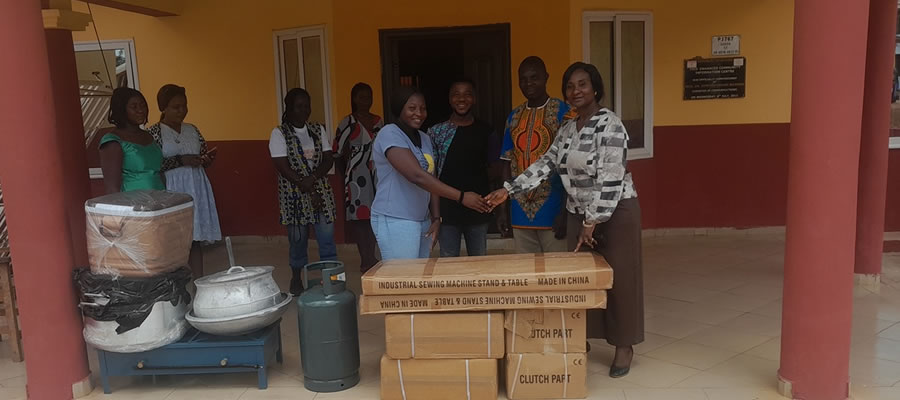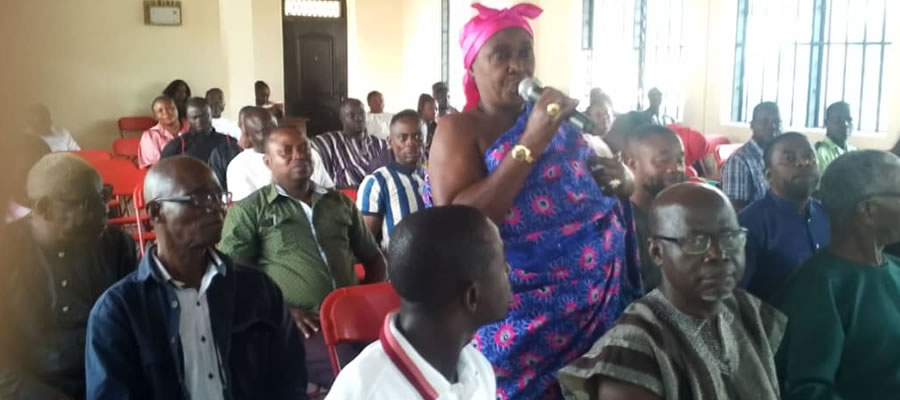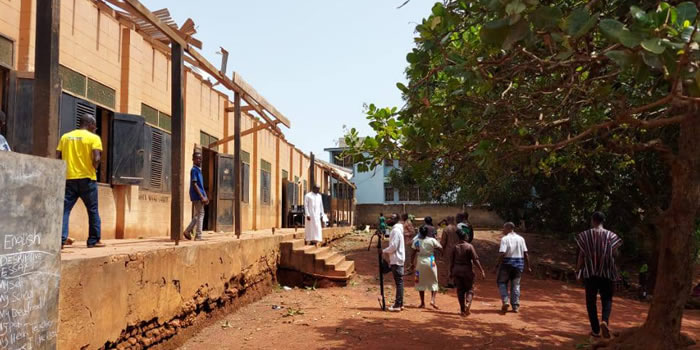

The major occupation in the Municipality is agriculture which employs about 58.2% of the labour force and constitutes the main source of income for the people. It accounts for 75.9% of the Municipality’s total income. Out of the 58.2% employed in agriculture, fishing which is one of the major economic activities in the district absorbs only 5.2% of the labour force.
Some of the major food crops produced in the Municipality include cassava, maize, rice, yam, cocoyam and plantain, while the cash crops include cocoa, citrus, coffee and oil palm.
To facilitate agricultural extension work, the Municipality has been divided into seven sub-districts. In order to boast the President Special Initiative, the Onuador Kroyekuo at Denyase has cultivated palm plantation and cassava. They have grown a vast land of cocoa plantation at Denyase.
In addition, they engage in food crop production such as maize, cocoyam and plantain. Extension agents are in all the sub-district and they offer technical advice to the farmers. Currently there are 22 extension officers in the district. The average farm size for the Municipality is estimated to be 5.3 acres, which is slightly higher than national average of 5.0 acres. The Municipality has comparative advantage in the production of maize, cocoyam and cassava as compared to the production of yam and plantain. Majority of farmers in the Municipality resort to simple farm implements such as hoe, axes and cutlasses in their work.
The type of industry in the Municipality can be categorized into five; Textile based industry, Agro industry, craft, metal based industry and services. About 40% of these industries are agro- based with palm oil and Palm kennel extraction as a major agro based industry. iThe Assembly has a number of economic and financial services which are vital to facilitate development in the Municipality . They include railway station at Bekwai, banking station sited at Bekwai, Kokofu, and Anwiankwanta, petrol filling stations at Bekwai, Kokofu Essumeja and Anwiankwanta.
These provide fuel to transport operators. In addition, the Ghana Private Roads Transport Union (GPRTU) stations at Bekwai, Kokofu, Essumeja and Ofoase –Kokoben all facilitate the flow of goods and services in the district. Periodic and daily markets at Bekwakai, Kokofu, Poano and Nsuta serve as points of exchange of goods and services, thus facilitating economic transactions.
In 1996, a survey revealed that 79.4% made up of 44.1% males and 33.3% females were employed. Others who are housewives, physically challenged, students and apprentices constitute 11.3% which is made up of 5.2% males and 6.1% females.
Between 2002 and 2003, the Assembly spent ¢6,202,997,370.461 billion on completion of 30 projects. These include the construction of 20 six units’ classroom blocks with offices, stores, sanitary facilities, aqua privy toilets, incinerators, police and nurses quarters and others. Also, between 2004 and 2005, the Assembly with assistance from IDA/GOG, COMMU,QUIP, ILP spent an amount of ¢9,085,123,032.8 billion on the Assembly’s projects.
Currently, ¢1,288,508,293 billion has been earmarked for the five ongoing projects in the Assembly. This includes the construction of abattoir at Bekwai zongo, three units’ classroom and sanitary blocks and construction of ten seater aqua privy.
The current population is 162,270, out of this figure, 79,999 are male while 82, 271 are females. The male and female ratio is 1:1.03. Presently, the population growth rate is 3.0% and the average household size is estimated at 7.1 people, which is higher than the national rural figure of 5.2 persons. This implies that each household has a large number of people to feed, cloth and house. The low per capital income stands at ¢11.172.81. This indicates that, the bulk of the families income goes into food (37.2%), clothing (11.0) and education (27.5%).
In order to provide employment for its numerous youth, the Assembly intends to organize training workshops for the youth in soap making, snail, mushroom farming and batik tye and dye making .These would be held at various locations in the Municipality. The Assembly intends to support these groups with credit after their training to set up their own business to generate income for their upkeep. The Assembly is therefore looking forward to any investor who is interested in partnering the Assembly to achieve this laudable objective of providing jobs for its unemployed youth.
Bekwai Municipal Assembly has a mission and responsibility to improve the quality of life of the people through sustainable development.To achieve this mission, the Assembly has set itself the following objectives. To facilitate the effective functioning of local government administration in the district. To ensure efficiency and effectiveness in the use of resources of the Assembly and it’s decentralized departments.
To monitor, co-ordinate and harmonize the implementation of development plans and activities in the Assembly. To facilitate the provision of basic social and economic infrastructure and services in the district. To facilitate community based and private sector development in the Municipality.
Property rates and others rates, lands, fees and fines, licenses, rent, investments and miscellaneous are the main sources of the Assembly’s revenue generation. External inflow of income include funds from District Assemblies common fund, EU/Micro projects programme, World Bank sponsored water and sanitation programme, Village infrastructure and Aids programme.
The Municipality can boast of five NGO’S namely Save the Children Fund, Community Project Support Services (COPSS), Technoserve, Adventist Relief Agency, CEDEP and Network for Health and Relief services.
Investment and Business Potential
Potential Areas of Investment
Investors are being encouraged to invest in adding value to the raw food, cereal, and citrus and other agriculture produce to improve farmer’s income and reduce post –harvest losses. Small scale factories for the manufacture of fufu and cassava powder can be produced.
Again, the use of the raw oranges and pineapples to be turned to orange and pineapple squash as drinks. This could improve the nutritional status of the children in the Municipality, improve farmer’s income and create some level of employment.
Favourable Technical considerations in the Agriculture sector conductive to agriculture investment.
Availability of land for cultivation
Availability of water resources
Wide market opportunities both internal and external market
Strategic location of the Municipality in relation to the Region.
Availability of MOFA technical officers to assist farmers.
Availability of labour both skilled and unskilled.
Incentives:
Investors in this sector will benefit from some tax holidays (from start to operation). Duration depends on the investment to be undertaken.
Enabling environment created by the Assembly for Investors Good road system
Telecommunication facilities
Stability in the security system
Challenges of the Agriculture Sector
Over-dependence on Rain –Fed Agriculture
Problem of Post Harvest losses due to gult
Inability to add value to agric produce to enhance farmer’s incomes
Farmer’s inability to access micro-credit.
The way forward
Promotion of irrigation form of farming for all year round farming
Creation of land banks for large scale farming
Supporting the youth to enter into agriculture with incentive package.
Lobbying for investors to invest in the agriculture sector eg. rice cultivation, citrus cultivation.
Date Created : 11/24/2017 7:31:06 AM












 facebook
facebook
 X
X
 Youtube
Youtube
 instagram
instagram
 +233 593 831 280
+233 593 831 280 0800 430 430
0800 430 430 GPS: GE-231-4383
GPS: GE-231-4383 info@ghanadistricts.com
info@ghanadistricts.com Box GP1044, Accra, Ghana
Box GP1044, Accra, Ghana